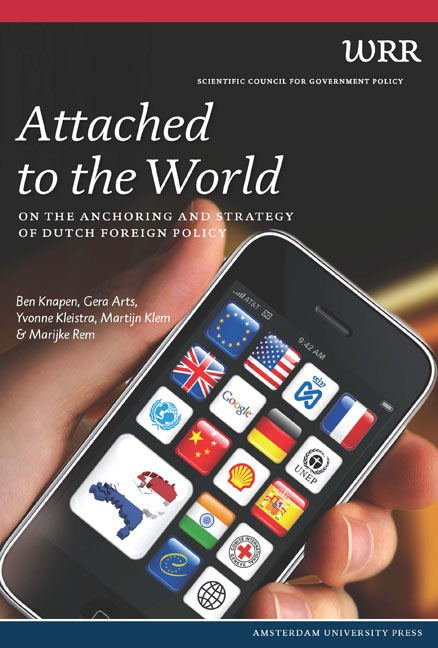Book contents
- Frontmatter
- Contents
- Summary
- Preface
- 1 Motivation and Background: An Introduction
- 2 From Fragmentation to Strategy
- 3 Europe: Arena and Link
- 4 Directing and Facilitating
- 5 Conclusions and Recommendations
- List of Abbreviations
- References
- List of Interviewees
- Appendix 1 The Interrelatedness of the Dutch EconomY
- Appendix 2 The Interrelatedness of the Netherlands With other Nations
- Appendix 3 The Dutch Network of Embassies in a Comparative Perspective
- Appendix 4 Sovereignty in Eu Member States: A Comparison
Appendix 2 - The Interrelatedness of the Netherlands With other Nations
Published online by Cambridge University Press: 19 January 2021
- Frontmatter
- Contents
- Summary
- Preface
- 1 Motivation and Background: An Introduction
- 2 From Fragmentation to Strategy
- 3 Europe: Arena and Link
- 4 Directing and Facilitating
- 5 Conclusions and Recommendations
- List of Abbreviations
- References
- List of Interviewees
- Appendix 1 The Interrelatedness of the Dutch EconomY
- Appendix 2 The Interrelatedness of the Netherlands With other Nations
- Appendix 3 The Dutch Network of Embassies in a Comparative Perspective
- Appendix 4 Sovereignty in Eu Member States: A Comparison
Summary
How strongly the Netherlands is attached to other nations is shown, successively, by the intensity, the width, and the depth of Dutch interrelationships with other nations. The intensity of this attachment may best be illustrated by means of one of the globalisation indexes. The KOF index of globalization is one of the most widely used. In its 2010 listing, the Netherlands ranks third (Table 1).
The width of the Dutch attachment to other nations is shown if, in the degree of globalisation, we distinguish economic, social, and political interrelatedness (for indicators of this classification, see below). The Netherlands obtained its third position in the 2010 index because of its fourth position in the economic globalization index, its fifth position in the social globalization index, and its seventh position in the political globalization index (see Table 2). A remarkable fact in comparison with other countries is that the Netherlands has no low scores in any category.
The Dutch attachment to other nations, finally, is deep because it is not dependent on one particular geographical location in the Netherlands. A comparative study of the degree of globalisation of cities shows that the first Dutch city, Amsterdam, is found only in 23rd position (FP Global City Index 2008). Dutch globalisation, therefore, is not dependent on one or two core areas. Finally, its attachment to other nations also appears to be strong and enduring. Between 2003 and 2010, the Netherlands never came lower than seventh position in the annual index. Only two other countries also figured among the 10 most interrelated countries on the KOF globalization index without exception in this period: Canada and Switzerland.
The indicators underlying the kof index of globalization (Dreher 2006 and
Dreher, Gaston and Martens 2008) are:
A Economic Globalization [37%]
i) Actual economic relations (50%)
– Trade (as a percentage of gdp) (19%)
– Direct foreign investments, influx (as a percentage of GDP) (20%)
– Direct foreign investments, shares (as a percentage of GDP) (24%)
– Portfolio investments (as a percentage of GDP) (17%)
– Wage payments to foreign citizens (as a percentage of GDP) (20%)
ii) Restrictions (50%)
– Hidden import barriers (22%)
– Mean tariff rates (28%)
– International trade tax (as a percentage of current revenues) (27%)
– Capital account restrictions (22%)
- Type
- Chapter
- Information
- Attached to the WorldOn the Anchoring and Strategy of Dutch Foreign Policy, pp. 143 - 146Publisher: Amsterdam University PressPrint publication year: 2012



